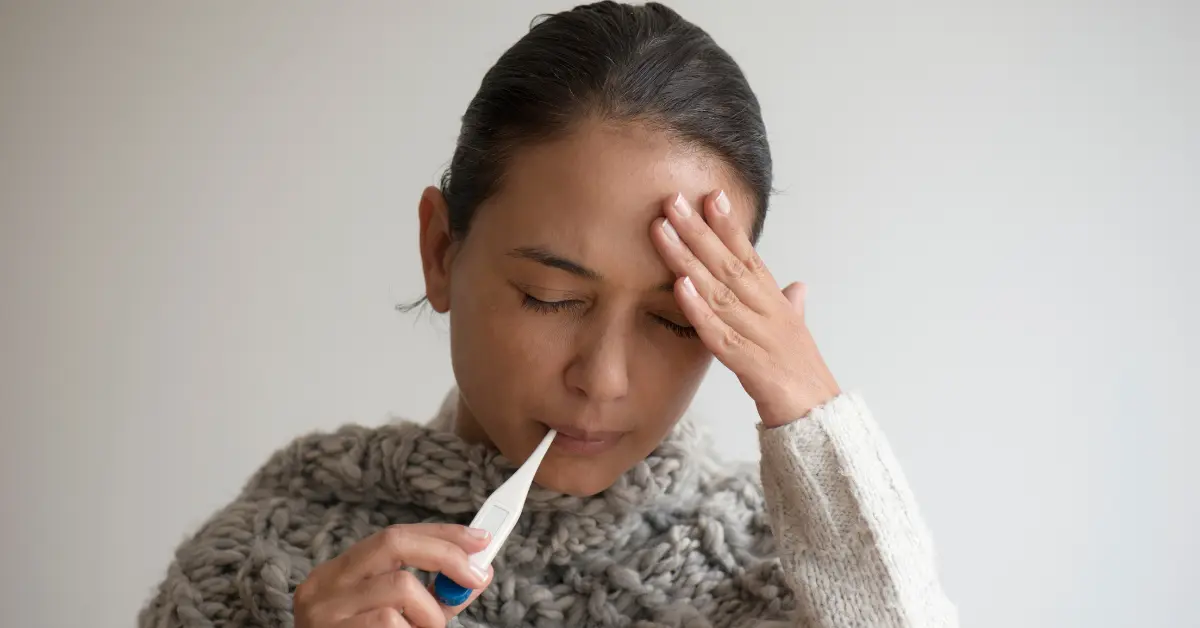PMS Fever: What You Need to Know
Fever is also a symptom of PMS, although not very common. However, it can still impact the quality of life of a woman.
Premenstrual Syndrome or PMS is a set of physical and mental symptoms before the start of the period.
According to the American College of Obstetricians and Gynecologists, up to 90% of menstruating women experience some symptoms of PMS.
PMS fever is often referred to as the “period flu.
For more information about PMS fever, continue reading the article.
Can PMS cause fever

Fever is a PMS symptom involving a rise in a woman’s body temperature in the days leading up to the beginning of menstruation.
The experts are still determining exactly what causes fever before periods.
Although, fluctuations in the hormone levels throughout the menstrual cycle are the most likely cause.
Before the period, Prostaglandins are made by the body to help the uterus shed its lining.
The excess Prostaglandins get into the bloodstream and cause many digestive symptoms linked to the period, like cramps, diarrhea, and pain.
It can also lower the body temperature when Prostaglandin molecules come in contact with Hypothalamus and cause PMS low-grade fever.
The Estrogen levels decrease during the second phase of the menstrual cycle, which can also lead to different PMS symptoms.
Ovulation can also cause the basal body temperature to increase between 0.5 to 1.0 degrees Celsius, leading to fever.
During the luteal phase, the amounts of hormones like Progesterone may change to prepare for pregnancy.
This makes the immune system weak and leads to fever or flu-like symptoms.
However, it is not contagious like normal flu.
How to relieve the symptoms of PMS fever
The symptoms of PMS generally go away a few days after the period starts.
After periods, the hormone levels will return to normal, making the temperature return to normal.
But there are a few things that can be done to relieve the symptoms of PMS fever, including:
OTC medications
Over-the-counter medications like Nonsteroidal anti-inflammatory drugs can be used to decrease the symptoms of PMS like fever, inflammation, and headache.
They can block Prostaglandins production, which helps decrease the symptoms.
Try Brufen 400mg for fast and effective relief.
Birth Control Pills
Hormonal Birth control pills can also help decrease the symptoms of PMS.
Birth control pills stop ovulation, lowering the amount of prostaglandin made in the uterus.
Prevention
Steps can be taken to prevent PMS symptoms. Some of them include:
Regular exercise

Exercising regularly can help in getting rid of PMS symptoms.
Aerobic exercise has been proven to decrease the symptoms of PMS.
Consuming healthy food
Maintain a balanced diet of nutritious whole grains, nuts, etc.
Making healthy food choices and cutting back on sugar, caffeine can reduce the symptoms of PMS.
Get a good night’s sleep
Sleeping for seven hours a day can help in reducing PMS symptoms.
Not getting enough sleep can hugely impact a person’s life.
Quit smoking
A study has found that smoking can make the symptoms of PMS worse.
It can also lead to irregular periods and early menopause.
Supplements
Vitamin and calcium supplements can help in decreasing the symptoms of PMS.
Consult a specialist and try to add these supplements.
Takeaway
PMS can cause flu-like symptoms, which include fever.
It is not very common but might hamper the person’s quality of life.
Even though the exact cause is not known, fluctuating hormonal levels are likely the leading cause of these symptoms.
Over-the-counter medications like NSAIDs (Brufen 400 mg) and birth control pills can help manage the symptoms of PMS.
Exercising regularly, and eating healthy and balanced, among other steps, can help in preventing the symptoms in the future.
If the symptoms get severe, consult a specialist for a proper diagnosis and treatment.
Frequently Asked Questions
Can PMS cause fever?
Yes, PMS can cause fever, even though it is not a very common symptom. During the luteal part of their cycle, some women may feel a slight rise in their body temperature. Changes in hormone levels during the monthly process are thought to cause this rise in body temperature.
How long does PMS fever last?
The length of a PMS fever can be different for each woman. PMS fever is not usually a severe or long-lasting symptom; it usually only lasts a few days to a week.
Can PMS cause flu-like symptoms?
Yes, PMS can cause flu-like symptoms. However, it is not contagious and won’t spread to others like the actual flu. It happens due to the fluctuations in the hormone level due to the menstrual cycle.
Does your temperature rise before your period?
Yes. The temperature can rise before the period. This can happen due to the changes in the hormone levels during the menstrual cycle.
Is my immune system weaker before my period?
Yes, hormone changes like Progesterone and Estrogen levels impact the immune system before periods. The immune system gets repressed and, therefore, even causes symptoms like fever.
WowRx uses only high-quality sources while writing our articles. Please read our content information policy to know more about how we keep our content reliable and trustworthy.






